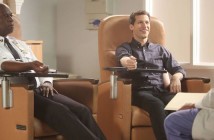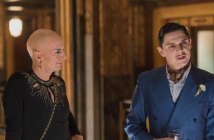December 5, 2015, 9:00 p.m. (EST), BBC
Doctor Who is a tale told by an idiot, full of sound and fury, signifying nothing. It is a show built on the iconic, trading heavily in iconography. It’s stories are always bigger than it can manage—that’s what makes them Doctor Who stories. The show laughs in the face of budget constraints, shrugs off impossible puzzles or inexplicable phenomena with a shrug of its shoulders and an utterance of the phrase “timey wimey.” It has survived decades. It has survived its own cancellation. It is a show that can go anywhere and do anything, but it’s always on the run, always searching for the next big idea, chasing the next genre trend, trying to catch the horizon and turn out the perfect story, the one that will end all stories.
“Hell Bent,” is, in a way, the perfect Doctor Who episode. It’s not a great one, not a perfect capper to this season or to the stories it’s been telling. It is big and bombastic until it is quiet and intensely personal. It is heart-breaking and life affirming in equal measures. And it works on several levels, as an origin story for The Doctor, as a return to the series for Gallifrey, as an ending for Clara and a beginning for whatever comes next. No, it doesn’t make much sense. No, it doesn’t ever really pay off the idea of the hybrid (which was one of Moffat’s lesser arc ideas anyway), and yes, it brings back Clara for the umpteenth time, undercutting her lovely and heartbreaking death in “Face the Raven.” This is an episode that gets a lot of things wrong in some pretty big ways.
And yet, there is so very much it gets right. The idea of Clara and Me running through space and time in a TARDIS stuck resembling an American diner is just such a fantastic closing image for those characters (presuming Ashildr doesn’t return, though of course we could meet her earlier in her timestream) it almost undoes the fact that Moffat has functionally killed and resurrected Clara something like a dozen times at this point. Everything about The Doctor’s return to Gallifrey is handled perfectly. It carries all of the weight and epic import it needs to come off, even though as soon as The Doctor takes power (he’s been made Lord President at least twice now, showing that Moffat, after all these years of avoiding Gallifrey, still didn’t have much of an idea of what to do with a story set there) everything sort of falls apart. There’s a lot of running around in the back half of the Gallifrey section of the story, although why people are running becomes fairly murky. Insofar as everything on Gallifrey is just The Doctor’s plan to save Clara, it’s also a little boring, and this is a story set on the planet of the Time Lords that really doesn’t need Time Lords at all. “Hell Bent” isn’t a Gallifrey story at all, though. It’s a story about taking the long way round. It is, in other words, the kind of story Steven Moffat does best: a story about Doctor Who.
There’s plenty to discuss here in the trappings, from a regeneration that changes both race and gender (something that was just always obviously possible, but hey, good on Moffat for throwing that in there, I guess) to another trip to the end of the universe (where The Doctor spends way too much time, honestly). But really, the return of Gallifrey functions as an after thought, and in a way that is entirely appropriate. The Doctor doesn’t want Gallifrey back any more than writers like Moffat want to try to figure out what to do with a looming plot point that will excite legions of fans and ultimately disappoint them. Gallifrey is a shell game. Like the Daleks, it exists to serve a narrative function, but it doesn’t fit that function so much as signify the hole where it should be. The Doctor needs an arch nemesis, so we get the Daleks, even though Dalek stories only very rarely live up to that idea. And The Doctor runs, so he needs a place to be running from. Gallifrey is the setting of at least on great Doctor Who story, and at least four really bad ones. It’s best function is the one Russell T. Davies came up with, as the home The Doctor left and grew to miss once it was gone. But it was inevitable the planet would return, so here it is to show up periodically when the show wants to do an epic story but cannot be bothered to come up with anything more than “eh, and the Time Lords are there.” This isn’t disappointing so much as its inevitable. That’s what Gallifrey has always been for, and this isn’t a show about Time Lord politics and high society anyway. Gallifrey exists for The Doctor to run from it, and Doctor Who needs periodic reminders of why that’s the case.
In the end, “Hell Bent: is the rightful culmination of The Doctor and Clara’s toxic codependence. The show has muddled that as an arc quite a lot, but the basic gist of the idea that Missy threw The Doctor and Clara together because they were too alike, and that together they are the Hybrid that threatens all of time and space is pretty dumb but also somehow appropriate. Clara becoming more and more like The Doctor has made treating her like a companion increasingly difficult, which on a metatextual level has led to some odd choices in what to do with her this season. She would never leave The Doctor of her own accord, and Moffat has proven himself to be too much of a softy to actually kill her for that devotion. So instead, she becomes The Doctor, functionally, flying off to have her own adventures and leaving a Clara shaped hole in the show and in The Doctor’s life (let’s not pretend Big Finish didn’t shit itself with excitement at the idea of a series of audios following Clara and Me’s adventures in time and space, either).
Moffat treats Gallifrey as a place worth seeding ideas about, but not really worth engaging with. His work on the show has smartly walked the high wire of revealing more about The Doctor and Gallifrey than anything else in the show’s history without removing the sense of mystery that keeps both engaging. So we get Cloister Wraiths and references to the Cloister Wars. We get more of a sense of how Time Lord society functions than we have ever seen previously, and we get the basic story of how The Doctor ran away from Gallifrey the first time. We also get the idea of The Doctor as a feared war hero to Gallifrey’s armed forces, an interesting new angle I am sure someone will mine someday. Gallifrey always offers to say something about what its like to go home again, and the way that expectations and the weight of memory constrict who you can be there. But these are throw away ideas Moffat mostly ignores to get back to the story of Clara and The Doctor, and the poignant ending of the relationship that could have destroyed the universe.
I came to love Clara Oswald as a companion, even though I’ll readily admit the show only occasionally got close to getting her arc right. It ends here in an incredibly appropriate, and appropriately muddled way, and “Face the Raven,” “Heaven Sent,” and “Hell Bent” function as an excellent trilogy on the loss of Clara and The Doctor’s grieving process. He gets away from her, in the end, at least enough to move on and have what looks like it will be a blast of a Christmas adventure alongside River Song. But she’ll always be there, a hole in his memories and his heart that he’ll never be able to fill. He can’t stay put in his grief for long. He can’t stay put anywhere. He’s The Doctor. It’s time for him to go. All of time and space. We can watch him run.
The Roundup
- “You been travelling?” “Yeah. From time to time.”
- “Is it a sad song?” “Nothing’s sad ‘til its over. Then everything is.”
- “I heard The Doctor had come home. One so loves fireworks….”
- “Words are his weapons.” “When did they stop being ours?”
- “Get off my planet.”
- “Sort of Glasgow. Space Glasgow!”
- “There was a saying, sir. In the Time War.” “A saying?” “The first thing you notice about the Doctor of War is he is unarmed. For many, its also the last.”
- “Stories are where memories go when they’re forgotten.”
- “At the end of everything, one must expect the company of immortals.”
- “I’ll need help.” “Gallifrey is at your command.” “Not from you lot. You cramp my style. Look at your hats!”
- “They only attack if you make any attempt to leave.” “How long are we planning to stay?” “Or, actually, if you stay…”
- “What do you say to lunch followed by breakfast, because we’re time travelers and that’s how we roll!”
- “Tomorrow’s promised no one, Doctor. But I insist on my past. I am entitled to it. It’s mine.”
In the end, “Hell Bent: is the rightful culmination of The Doctor and Clara’s toxic codependence.
-
GOOD




